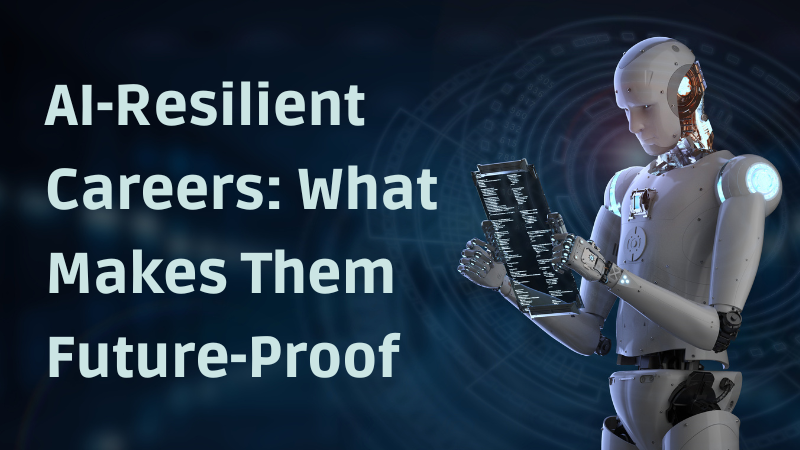As artificial intelligence rapidly evolves, reshaping industries and automating tasks once thought secure, a central question dominates workforce conversations:
What jobs are safe from AI?
The answer isn’t a simple list of roles, but a set of qualities that define AI-Resilient careers jobs that adapt, endure, and even thrive in the face of automation. Understanding these qualities is essential not only for career planning but for policy makers, educators, and businesses shaping the future of work.

Table of Contents
1. Human-Centric Tasks and Emotional Intelligence
Jobs that rely heavily on emotional intelligence—empathy, persuasion, intuition, and trust-building—are difficult for AI to replicate. While AI can simulate conversation and even recognize emotional cues, it does not experience feelings or human relationships in a real sense. Roles that require emotional presence, such as therapists, social workers, nurses, teachers, and leadership positions, depend on a human understanding of nuance, context, and morality and AI-Resilient.

For example, a nurse doesn’t just administer medication; they provide comfort, interpret emotional states, and build trust with patients and families. A great teacher adapts to the moods, needs, and learning styles of students in real time. These are not checklists that AI can simply process—they involve subtle, real-time negotiation of interpersonal dynamics.

Key trait: High emotional and social complexity.
2. Creative and Original Thinking
AI can generate music, write essays, and design graphics and AI-Resilient,but it does so by learning patterns and remixing existing ideas. It lacks genuine originality and human taste. Creative careers that involve conceptualizing new ideas, disrupting norms, or setting trends retain strong resistance to automation.

AI-Resilient Artists, writers, marketing strategists, product designers, and entrepreneurs thrive on unpredictability and innovation. Their value comes from questioning the status quo, not just optimizing it. While AI may become a useful tool in creative processes, it’s still the human mind that defines what’s “good,” “beautiful,” or “meaningful.”

Key trait: Unstructured creative synthesis and boundary-pushing.
3. Complex Problem Solving in Unpredictable Environments
AI excels at problems with clear parameters and abundant data. But many high-stakes jobs involve ambiguity, shifting conditions, and high levels of judgment—factors that AI still struggles with AI-Resilient Surgeons, emergency responders, legal strategists, senior engineers, and systems architects face problems that aren’t neatly categorized or easily reduced to rules.
For example, a software engineer debugging a critical failure in a legacy system with undocumented code must rely on intuition, pattern recognition, and experience. Similarly, a criminal defense attorney must navigate a client’s emotional needs, jury behavior, and inconsistent legal precedents—all in real time.
Key trait: Adaptive reasoning under uncertainty.
4. Cross-Disciplinary Knowledge and Systems Thinking
AI typically specializes in narrow tasks. Human professionals who synthesize knowledge across disciplines remain vital in a world increasingly dominated by specialization. These “connective” thinkers understand how various parts of a system interact—whether it’s ecosystems, organizations, supply chains, or technologies.
Professionals like urban planners, management consultants, and product managers integrate knowledge across business, technology, society, and design. Their role is to ask the right questions, not just provide fast answers. These integrative thinkers see connections others miss and create solutions that machines, focused on one layer at a time, can’t generate.
Key trait: Holistic and integrative thinking across domains.
5. Hands-On and Physical Work in Dynamic Settings
While robotics is advancing, many physical tasks in unpredictable, unstructured environments remain difficult to automate. Skilled trades electricians, plumbers, carpenters, auto technicians, and even chefs—require dexterity, spatial reasoning, and improvisation.
AI can help diagnose engine issues or design a kitchen layout, but it can’t climb under a sink in a cramped apartment or adjust to last-minute changes in materials on a construction site. These jobs require real-world problem solving, embodied knowledge, and hands-on execution, often under conditions AI cannot yet simulate effectively.
Key trait: Skilled physical interaction in variable conditions.
6. Ethical and Strategic Decision Making
In roles where decisions affect lives, institutions, or large populations, ethics and accountability matter.AI-Resilient Judges, CEOs, policymakers, and military leaders face decisions where the “right” answer isn’t just based on data—it’s tied to human values, long-term trade-offs, and moral responsibility.
Even as AI advises, the final responsibility must lie with humans. Delegating moral judgment to machines is risky, not just practically but philosophically. Human oversight, judgment, and responsibility in such contexts are not replaceable, even if AI provides input.
Key trait: Value-driven judgment with long-term implications.
7. Lifelong Learning and Adaptability
Perhaps the most important trait of all: adaptability. The most AI-resilient careers are not tied to a single role but a mindset—those who embrace learning, growth, and reinvention. In a fast-changing world, the ability to pivot across industries, pick up new tools, and learn from experience will matter more than specific job titles.
Professionals who continually build new skills—especially in digital fluency, communication, data interpretation, and interdisciplinary knowledge—position themselves to lead rather than follow the wave of automation.
Key trait: Growth mindset and continuous upskilling.
Conclusion: Designing Your Career for AI Resilience
There is no “unhackable” job in the age of AI. What exists instead are resilient qualities—human strengths that machines struggle to mimic. Emotional intelligence, creativity, adaptive reasoning, cross-disciplinary fluency, hands-on execution, ethical leadership, and a habit of lifelong learning—these are the traits that define future-proof work.
As automation evolves, the goal shouldn’t be to compete with machines but to work alongside them, doing what humans do best. The most AI-resilient professionals will leverage AI as a tool, not fear it as a threat. They will focus on being more human, not less—because that’s where the true advantage lies.
In a world of accelerating change, resilience is not a job title. It’s a way of working—and thinking—that keeps you relevant, valuable, and in control.
_____________________
YOU MAY ALSO LIKE:


